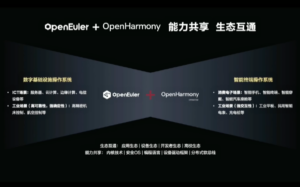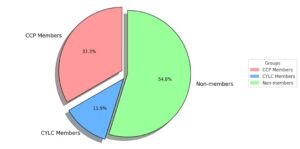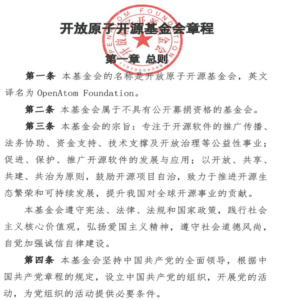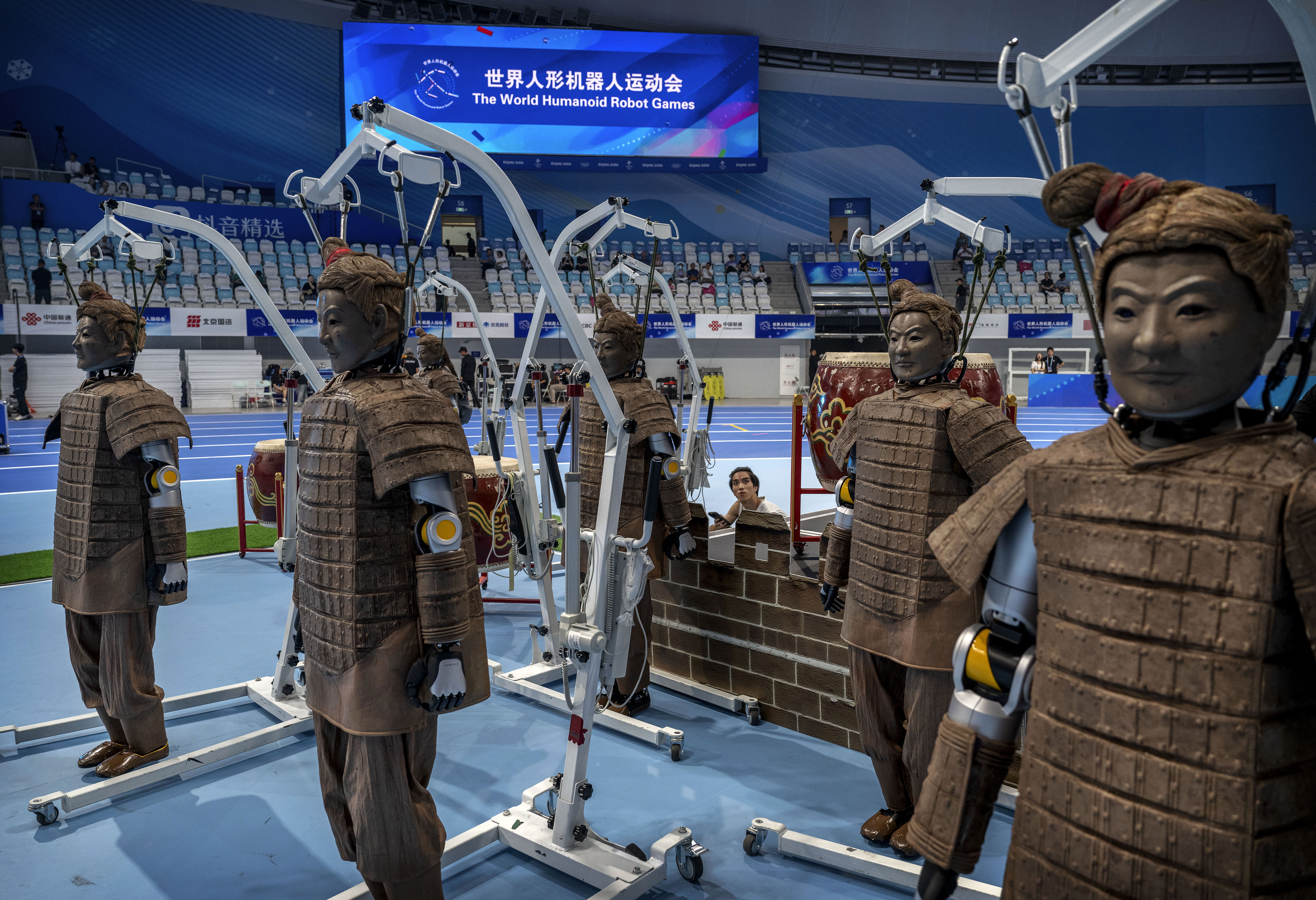
Open-Source Technology and PRC National Strategy: Part I
Open-Source Technology and PRC National Strategy: Part I
Executive Summary:
- The OpenAtom Foundation supports open-source technology in areas such as RISC-V architecture and Electronic Design Automation. These efforts are part of a strategy by the People’s Republic of China (PRC) to navigate and overcome technological containment by the United States, showcasing the foundation’s role in leveraging open-source as a strategic asset.
- OpenHarmony, an open-source version of Huawei’s HarmonyOS, and openEuler, a Linux distribution developed by Huawei, are the foundation’s flagship projects. They are part of a strategy to reduce reliance on foreign technologies and enhance self-reliance and innovation.
- OpenAtom’s alignment with state objectives is evident in its governance and strategic direction. Despite being a non-governmental organization, at least 45 percent of its employees are affiliated with the Chinese Communist Party (CCP). This alignment is particularly visible in the foundation’s efforts to develop and promote open-source ecosystems as a tool for technological and geopolitical advancement.
- Open-source technology allows for global collaboration and innovation, but organizations like OpenAtom existing within the PRC are influenced by the agendas and strategies of the PRC’s government. The openness of these technologies makes them susceptible to vulnerabilities and manipulation.
Editor’s Note: This article is the first in a two-part series. The second part, which will focus on the open-source operating system OpenHarmony and its links to the PRC’s military-civil fusion development strategy can be read here.
In mid-April, a series of technology challenges, competitions, and seminars took place in Suzhou Industrial Park, hosted by the OpenAtom Foundation and the organization openDACS (OpenAtom, April 14). The event explored the application of emerging technologies, including the open-source RISC-V architecture and EDA—areas particularly sensitive due to US export controls (see China Brief, December 15, 2023; March 15). Challenges focused on integration and industrial applications of open-source technology. These included electromagnetic simulation software, the latest simulation software for aviation engines, and computational mechanics software for integrated circuit design tools (OpenAtom, April 16).
The event, held across several days, provides a window on the eagerness of both government and industry in the People’s Republic of China (PRC) to leverage open-source technologies to address real-world challenges. The desire to nurture an open-source ecosystem is part of a broader strategy, and open-source technology is being leveraged as a dual-use tool for advancing the PRC’s technological capabilities and, by extension, its geopolitical power. [1]
The Party-State Opens up to Open-Source
Data from the Academy of Information and Communications Technology reveals the extent of open-source technology in domestic industry (Ximalaya, July 19, 2023). Over 90 percent of PRC enterprises currently use open-source technology, with thousands of open-source components employed in sectors like finance and telecommunications. The adoption rate of open source for cloud computing and big data exceeds 40 percent. The widespread application of open-source is critical. Already in 2021, Dong Dajian (董大健), Deputy Director at the National Industrial Information Security Development Research Center, noted that virtually all software with more than one thousand lines of code now relies on open-source components (Baijiahao, July 31, 2021).
This emphasis on open-source technology can be traced to 2020, when geopolitical tensions prompted the PRC to develop its own open-source ecosystem due to concerns about an overreliance on Western platforms. A Huawei executive emphasized the PRC software industry’s vulnerability to external factors without a local open-source infrastructure (Baijiahao, August 24, 2020). Gitee was founded shortly after by a consortium led by OSCHINA (深圳市奥思网络科技有限公司), Huawei, and national research institutes.
In March 2021, open-source technology was included in PRC’s 14th Five-Year Plan for the first time. This plan highlights the government’s support for the development of digital technology open-source communities and innovative consortia, signaling the strategic importance of open source to national development (Xinhua, March 13, 2021). Later that year, two other related plans were released. MIIT’s “14th Five-Year Plan for the Development of the Software and Information Technology Services Industry (‘十四五’软件和信息技术服务业发展规划)” articulated an expansion of the open-source ecosystem, underlining the critical role open-source software plays in navigating economic and trade challenges (MIIT, November 15, 2021). And the State Council’s “14th Five-Year Plan for the Development of the Digital Economy (‘十四五’数字经济发展规划)” advocated for the growth of open-source communities, platforms, and projects that feature indigenous core technologies (State Council, December 12, 2021). These strategic documents underscore the importance the PRC government has put on using open-source to help it achieve technological independence.
OpenAtom Foundation Shapes the Open-Source Ecosystem
The OpenAtom Foundation is a relatively new but influential player in the PRC’s tech sector. Founded in June 2020 in Beijing by Alibaba, Baidu, Huawei, Inspur, Tencent, China Merchants Bank, and 30 others, the OpenAtom Foundation is the first non-profit in the PRC dedicated to advancing the open-source movement. Its mission includes incubating open-source projects, fostering international cooperation, and enhancing technological philanthropy (OpenAtom, accessed May 2).

OpenAtom co-hosted the April competitions alongside openDACS. Established on October 16, 2021, openDACS is an initiative that brings together leading academic and research institutions in the PRC under one banner. One of its aims is to develop an open-source-based electronic design automation (EDA) platform. Spearheaded by the Chinese Computer Society’s Integrated Circuit Design Group (中国计算机学会集成电路设计专业组) and Open Source Development Committee (中国计算机学会开源发展委员会) in partnership with the OpenAtom Foundation, the project also includes contributors such as the Institutes of Computing and Microelectronics of the Chinese Academy of Sciences (CAS), Peking University, Fudan University, and Wuhan University of Technology (WHUT, October 27, 2021).
The foundation operates an open-source, distributed operating system (OS) framework known as OpenHarmony, which was donated by Huawei, as an open-source version of the company’s closed-source HarmonyOS (鸿蒙系统) (Gitee, accessed May 2). HarmonyOS is considered the keystone for Huawei to achieve its independence from Google’s Android OS and to further help the PRC enhance its goals of technological self-reliance (Nikkei Asia, May 8). Its open-source offshoot, OpenHarmony, is hosted on Gitee (码云), the PRC’s largest code hosting platform with 12 million users, where it has become highly influential (Gitee, December 2023). OpenHarmony already powers devices ranging from smartphones to cars, and is enabled for multi-device integration, creating seamlessly connected ecosystems (Aliyun, August 16, 2022). It can run on diverse hardware architectures including ARM, RISC-V, and x86, and on a wide range of smart devices (OpenHarmony, last accessed April 30).

The OpenAtom Foundation is home to other open-source projects, too. One such project is openEuler, also developed by Huawei. This platform operates as a Linux distribution, meaning it is based on the Linux kernel—a core component of the operating system that manages hardware resources. openEuler is tailored to leverage and extend Linux’s robust, secure, and versatile characteristics to meet specialized digital infrastructure needs. It has been adopted by various state-owned enterprises in the PRC, spanning sectors such as energy, telecommunications, and finance (openEuler, accessed May 2). openEuler supports a broad spectrum of applications, including cloud computing (OpenAtom, last accessed April 30). OpenEuler was prominently featured at the Open Source Summit Europe 2023. This event, organized by the Linux Foundation in Spain, included multiple discussions covering topics ranging from artificial intelligence (AI) to software supply chain security and community governance (OpenAtom, September 25, 2023).
OpenEuler and OpenHarmony serve different but complementary roles. OpenEuler is primarily designed for server and cloud environments. This makes it ideal for high-performance computing and enterprise applications. OpenAtom claims that by leveraging heterogeneous computing to boost AI system performance, openEuler can increase training efficiency by over 20 percent and inference concurrency by more than 50 percent (OpenAtom, January 15). OpenHarmony, meanwhile, is tailored to a broader spectrum of smart devices, from IoT gadgets to complex systems like smart vehicles, where flexibility and multi-device integration are prevalent. Together, these two platforms provide a foundation for seamlessly interconnected digital infrastructure and expansive technology ecosystem (Baijiahao, October 31, 2023).
The OpenAtom Foundation’s commitment to building an extensive open-source ecosystem is not just limited to software. It has embarked on strategic collaborations in various sectors. One such partnership is with the China Association of Automobile Manufacturers (中国汽车工业协会). This alliance focuses on six key areas: joint development of open-source projects and technology, co-building of an open-source ecosystem for automotive software, academic research, cultural promotion of open source, talent development, and ecosystem construction. This initiative is poised to explore the full potential of using open-source tech and to contribute to the digital transformation of the automotive industry (OpenAtom, November 16, 2023). Similar policy discussions can also be found in the industry surrounding the application of the RISC-V architecture to affordable yet powerful chips for the next generation of vehicles in the PRC (CYZone, December 26, 2023).
Through projects like OpenHarmony and openEuler, the OpenAtom Foundation is actively reshaping the open-source ecosystem, centralizing and mobilizing manpower and resources to mold and transform these initiatives to serve both technological advancement and the broader national goals.

The Party is the Core for OpenAtom
At first glance, the OpenAtom Foundation appears to mirror the operational ethos of Western open-source counterparts like the Linux and Apache Software Foundations. It embraces the common rhetoric of building international open-source communities, enhancing collaboration across industries, and offering neutral intellectual property custodianship to safeguard the independence and ongoing development of various open-source projects (OpenAtom, last accessed April 30). It professes a commitment to maintaining a sense of neutrality and to contributing positively to the global community—ideals that align it with the broader open-source movement.
A closer examination of the foundation’s structure and affiliations reveal a more nuanced reality that raises questions about the true independence of such an organization. According to its 2022 Annual Report submitted to the PRC government, which adheres to the regulations set forth by the Ministry of Civil Affairs and the Charity Law of the PRC, a significant number of the foundation’s employees are affiliated with the Chinese Communist Party (CCP) (OpenAtom, last accessed April 30). The 2022 report discloses that 33.3 percent of the foundation’s employees are members of the CCP. If one includes the 11.9 percent who are members of the Communist Youth League of China (CYLC), this figure rises to over 45 percent.

This holds true for the higher echelons within the foundation. OpenAtom’s board was updated in the last two weeks, and information on the new members is yet to be disclosed in detail. However, the foundational structure, patterns, and representation within the board remain unchanged. [1] That previous board, included several party members—most notably, the two vice-chairmen, Liu Xiangwen (刘湘雯) and Wang Juhong (王巨宏). Even board members who do not claim any political affiliation have significant ties to government and corporations connected to the state’s strategic priorities. For instance, Sun Wenlong (孙文龙), the board chair, previously held a director position within the Ministry of Industry and Information Technology (MIIT), where he was involved in software industry regulation (OpenAtom, December 27, 2023; BIT, January 23, 2014). Similarly, board members Xiao Ran (肖然) and Hou Zhenyu (侯震宇) hold senior positions at Huawei and Baidu, respectively (Baijiahao, July 31, 2021; iheima, July 10, 2021). These companies are known for their close alignment with state objectives. Zhang Hui (张晖), managing director at the IT conglomerate Inspur, serves on the foundation’s board and represents a company who contributes to party and governmental digital transformation and informatization projects (PRC Daily, May 16 2023; Inspur, last accessed April 30).
The OpenAtom Foundation’s relationship with the PRC’s state apparatus is further cemented by the OpenAtom Foundation Party Branch (开放原子开源基金会党支部). This organization operates under the direct supervision of the Party Committee of MIIT’s Talent Exchange Center. The secretary of the party organization within the foundation, Liu Jingjuan (刘京娟), plays a pivotal role in aligning the foundation’s activities with the Party’s agenda. In 2022, Liu organized nine party member meetings and facilitated 11 educational sessions for members, focusing on indoctrination and adherence to the Party’s policies and doctrines.

The foundation’s bylaws explicitly emphasize its commitment to “socialist core values” and the “spirit of patriotism,” which are fundamental to its operations and mission. Article Four of the foundation’s constitution declares the organization’s adherence to the “comprehensive leadership of the Chinese Communist Party.” It stipulates the establishment of party organizations within the foundation to conduct party activities and provide necessary conditions for these activities. This highlights its role as an instrument for executing party directives within the broader tech ecosystem.

OpenAtom Foundation’s mission, as submitted to the government on paper in 2022, espouses a dual objective. While it is committed to advancing the prosperity and sustainable development of open-source projects and ecosystems, it also aims to “enhance the global discourse power of our country’s enterprises in open-source governance.” At the same time, in response to an enquiry by the National People’s Congress, MIIT acknowledged efforts to enhance mobile operating systems through the establishment of open-source foundations, starting with the OpenAtom Foundation (MIIT, October 28, 2022). These efforts intend to encourage Huawei to help accelerate the development of key open-source projects, aiming to advance operating system research and development.
The OpenAtom Foundation is bolstered by its network of significant affiliated organizations and contributors. These include foreign tech leaders such as Intel, which is a platinum donor. The foundation is also supported by the China Industrial Control Systems Cyber Emergency Response Team (国家工业信息安全发展研究中心), a direct unit under MIIT. This unit, central to the PRC’s industrial information security sector, has led numerous national projects aimed at enhancing industrial transformation and security. It is involved in areas like technology innovation for national defense, cybersecurity evaluations, and software testing, positioning it as an essential player in advancing Xi Jinping’s agenda and the country’s industrial digital infrastructure (CICS, last accessed April 30).
OpenAtom Foundation’s candid statement of purpose aligns with CCP doctrine. The PRC’s approach to open-source technology aims to transform the nation from a “major open-source nation (开源大国)” to a “strong open-source nation (开源强国).” As articulated by Ni Guangnan (倪光南), a leading academician at the Chinese Academy of Engineering, the country’s open-source strategy has matured significantly, with future prospects centered on leveraging its extensive market scale, rich talent pool, and comprehensive national system to refine the ecosystem for open-source technologies (Shanghai Observer, May 27, 2023).
Conclusion
The OpenAtom Foundation, OpenHarmony, and openEuler are all prominent results of the PRC’s concerted focus on and efforts to develop open-source technologies. The use of supposedly neutral non-governmental organizations—which in fact have unusually strong ties to the party-state—to attract international collaboration is a clear part of the PRC’s national strategy. International collaboration in open-source projects is generally viewed positively, as it contributes to global knowledge production and technological advancement. But through this focus on building out from open-source technologies, the PRC can accelerate indigenous innovation through the incorporation of global technological expertise. In this way, instead of a reciprocal exchange in the spirit of open collaboration, there is cause for concern that key beneficiaries of the PRC’s efforts here are the military industrial complex, something that could have implications for international security and the global tech ecosystem as it is currently constituted.
Notes
[1] The author would like to thank Rick Switzer for his insights into open source hardware and its implications.
[2] The new board (see Table 1 below) continues to maintain significant presence from major tech giants such as Huawei, Tencent (腾讯), and Inspur (浪潮), among others. Notably, three board members from the previous term have continued into the new term: Liu Xiangwen (刘湘雯), Vice Chair; Wang Juhong (王巨宏), Vice Chair; and Gao Sumei (高素梅), Supervisor and Secretary-General of the China Electronic Information Industry Federation. All three are confirmed members of CCP, based on previous documentation. The newly appointed chair of the OpenAtom Foundation, Cheng Xiaoming (程晓明), previously worked for MIIT and the China Industrial Control Systems Cyber Emergency Response Team (CICS), just as did his predecessor Sun Wenlong (孙文龙).
Table 1: 2024 OpenAtom Foundation Board Members:
| Name | Title | Affiliation |
| 程晓明 (Cheng Xiaoming) | 理事长 (Chairman) | Open Atom Foundation, Former Deputy Director of the Office of the Ministry of Industry and Information Technology, Party Secretary of the National Industrial Information Security Development Research Center, Former Standing Committee Member of Harbin Municipal Committee |
| 张顺茂 (Zhang Shunmao) | 副理事长 (Vice Chairman) | Senior Vice President, Huawei Technologies Co., Ltd. |
| 王巨宏 (Wang Juhong) | 副理事长 (Vice Chairman) | Director of the Tencent Technology Committee |
| 刘湘雯 (Liu Xiangwen) | 副理事长 (Vice Chairman) | Vice President, Alibaba Cloud Intelligence Group |
| 李锐 (Li Rui) | 副理事长 (Vice Chairman) | Chairman and Dean, Inspur Science Research Institute Co., Ltd. |
| 彭江 (Peng Jiang) | 理事 (Board Member) | Senior Vice President, Chinasoft International |
| 韩乃平 (Han Naiping) | 理事 (Board Member) | Chief Scientist, Kirin Software Co., Ltd. |
| 王成录 (Wang Chenglu) | 理事 (Board Member) | CEO, Shenzhen Kaihong Digital Industry Development Co., Ltd. |
| 蒋涛 (Jiang Tao) | 理事 (Board Member) | Founder & Chairman, CSDN |
| 黄东旭 (Huang Dongxu) | 理事 (Board Member) | Co-founder & CTO, PingCAP |
| 刘闻欢 (Liu Wenhuan) | 理事 (Board Member) | General Manager, Uniontech Software Technology Co., Ltd. |
| 高素梅 (Gao Sumei) | 监事 (Supervisor) | Secretary-General, China Electronic Information Industry Federation |


